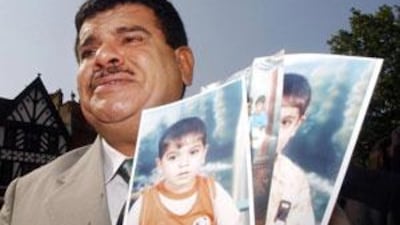LONDON // A public inquiry opened in London yesterday into claims that up to 20 Iraqis were unlawfully killed and others tortured by British troops after a firefight in 2004. The inquiry, chaired by a retired High Court judge, got under way less than 24 hours after the armed forces minister, Bill Rammell, announced a wide-ranging investigation into all allegations of abuse by UK forces after the 2003 invasion.
It means that there will now be three separate inquiries going on simultaneously into claims that British troops ill-treated and even murdered Iraqi prisoners, prompting fears that the glut of investigations could undermine the reputation of the country's armed forces. The first of the three inquiries - into the 2003 death of Baha Mousa, a Basra hotel worker - started last July and is still continuing. A post-mortem examination found that Mousa, a 26-year-old father of two, had 93 injuries on his body after being interrogated.
A second inquiry, which held its preliminary hearing yesterday under the chairmanship of Sir Thayne Forbes, is named after Hamid al Sweady, 19, one of those who died during or after the "Battle of Danny Boy" in May 2004. According to the British, all 20 Iraqis who died during the fierce battle at Danny Boy checkpoint in Maysan province were insurgents killed in action. The al Sweady inquiry will look at whether or not this was true, or whether some or all of the dead were killed after being taken back to the British base, called Camp Abu Naji.
Sir Thayne will also investigate claims by al Sweady's uncle and five other Iraqis who say they were abused by British troops at the camp. Bob Ainsworth, the defence secretary, has pledged full co-operation from the defence ministry. He said: "Over 120,000 British troops have served in Iraq and the conduct of the vast majority has been of the highest order. Although there have been instances of misconduct, only a tiny number of individuals have been shown to have fallen short of our high standards.
"Allegations of abuse are, however, taken very seriously. The inquiry will, of course, have the full support of the ministry of defence." Ministers and the military have always denied any ill-treatment of prisoners in the wake of the Battle of Danny Boy but the government was forced by the courts to set up a public inquiry. In a ruling last year, the High Court said the government had failed to meet its obligations under the European Human Rights Act for a timely and independent investigation for alleged wrongdoing by "agents of the state".
The al Sweady inquiry got under way shortly after Mr Rammell had not only announced a wide-ranging investigation into all allegations of mistreatment in Iraq, but had also revealed that training for British soldiers was to be improved to avoid abuse of civilian detainees. He said the investigation by his ministry's Iraq Historic Allegations Team would clear up "once and for all" dozens of other complaints from lawyers representing former detainees.
"Fighting amongst the people and under judgment of the people in very difficult circumstances has become the norm, and it is increasingly likely to be that way," Mr Rammell said. "How our forces operate in a cluttered and confusing environment will impact on support from civilians in theatre and support at home. "More than ever before, the abuse of detainees, mistreatment of civilians and the unnecessary destruction of property or livelihood and tragic loss of civilian life - are not only wrong but self-defeating."
Mr Rammell insisted that there was "no evidence whatsoever of a culture of widespread abuse of detainees by British service personnel" during the occupation of Iraq. He said that, if the Iraqis' claims being investigated by the al Sweady inquiry were true, British troops would have had to have been involved in a "massive conspiracy". The minister said he had ordered a wide-ranging investigation because dealing with individual abuse claims on a case-by-case basis was proving "slow and frustrating".
Mr Rammell said: "My greatest fear is that uncertainty created by these unproven allegations risks unfairly undermining the reputation and achievements of our armed forces. The time has come to deal with them once and for all." However, lawyers for about 60 Iraqis claiming maltreatment by UK forces yesterday expressed their dissatisfaction at the investigation announced by Mr Rammell, as it will be conducted by Ministry of Defence personnel, rather than under the auspices of an independent, public inquiry.
@Email:dsapsted@thenational.ae

